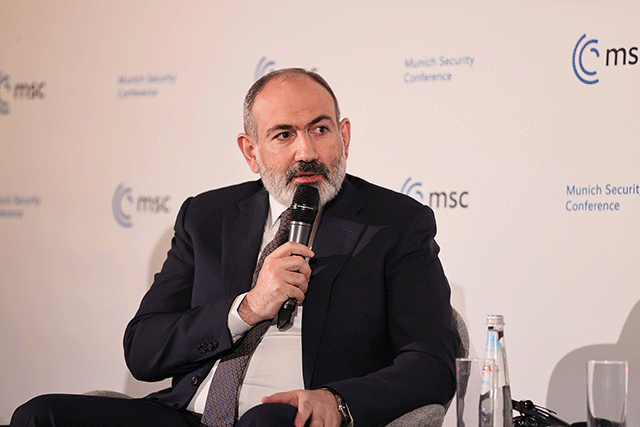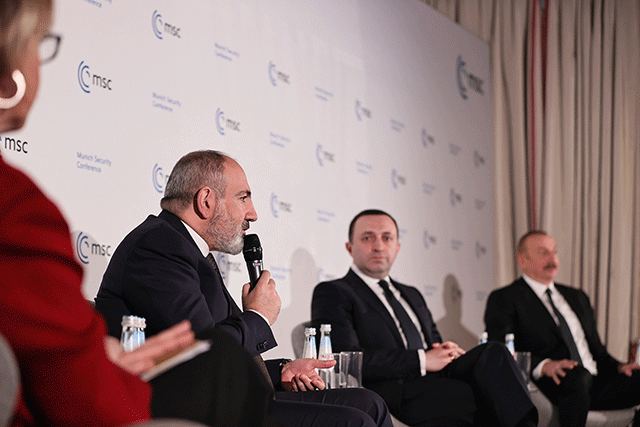Nikol Pashinyan participated in the discussion on regional security with the Prime Minister of Georgia, the President of Azerbaijan and the Secretary General of the OSCE
Prime Minister Nikol Pashinyan took part in the panel discussion on South Caucasus issues in the sidelines of the Munich Conference headlined “Moving Mountains? Building Security in the South Caucasus.” Georgian Prime Minister Irakli Garibashvili, Azerbaijani President Ilham Aliyev and OSCE Secretary General Helga Schmid also took part in the discussion.
Below are the questions addressed to Prime Minister Pashinyan by the moderator of the discussion and the Prime Ministers answers.
Read also
Question – Mr. Prime Minister, I would like to ask you to comment on the consequences of Russia’s war against Ukraine on your country.
Prime Minister Nikol Pashinyan – Thank you. I would like to thank you for organizing this format. I agree, maybe this is a historical meeting, but it is important to understand the context of the history that is being created at this moment, because we can have different results or consequences, and I think we should be result-oriented. This is our approach.
As for your question, global instability cannot have a positive impact on our regional situation, because you know that for a long time now, all international attention is understandably focused on Ukraine, and this creates new risks for our region. It is very important that our region also receives international attention, because I think there are many risks.
What is our approach? We remain committed to our democratic reform agenda because we believe that democratic reforms, the development of democratic institutions, the rule of law, human rights, and an independent judiciary will improve the situation around our region. We believe that this is beneficial for the entire region, and very important for us in terms of doing our part.
Question – Mr. Pashinyan, you are now also helping Turkey with this terrible earthquake. Do you think there are prospects for improving relations between Armenia and Turkey? Is it possible that this terrible disaster can be a reason for a change in your relationship?
Prime Minister Nikol Pashinyan – Thank you. You know, we had only humanitarian motives behind the decision to send humanitarian aid and rescuers to Turkey, because millions of people in our neighborhood were suffering, but during this time we witnessed a very positive reaction from the Turkish government, and if this move has political consequences, it will be even better. But our initial motive was purely humanitarian, and as we stated, we are ready to provide as much humanitarian aid as our capabilities allow, and we are ready to do it.
As for the political dialogue, to be honest, before the earthquake, we had already established a political dialogue through special representatives, and I think that dialogue is very important. I mean in terms of creating an appropriate atmosphere in which these decisions were made. And we believe that the possibilities of making political decisions in the context of this humanitarian dialogue will be even higher. We are ready to move forward and we believe that the establishment of diplomatic relations with Turkey and the opening of our border will have a very positive effect not only in terms of our regional situation, but also in terms of the international situation.
Question – Now I want to return to the question that President Aliyev alluded to at the beginning. We are talking about a war that started two years ago, and now we see a situation that still remains critical. We are not conducting negotiations here, but the international community is concerned about the humanitarian situation, and we, like everyone else, follow the humanitarian situation in Turkey, in the same way we follow the existing problem there. From the outside, we see that the Lacin Corridor is blocked. Mr. Prime Minister, I would like you to talk a little about confidence building efforts. Of course, we would like to see a decrease in tension through small steps that will bring us closer to the settlement of this conflict.
Prime Minister Nikol Pashinyan – Thank you. You are right. Lachin Corridor has been blocked for already 70 days. Unfortunately, there is now a humanitarian crisis in Nagorno-Karabakh, as well as an energy crisis, because the electricity supply to Nagorno-Karabakh is suspended, the gas supply is also suspended, and we have counted that the gas supply has been suspended at least 10 times in the last 70 days, and this is a problem that deserves attention. Our position is as follows. In the trilateral statement of November 9, 2020, we have very specific points regarding the Lachin Corridor, and according to that statement, it is the duty of Azerbaijan and the Russian peacekeepers to keep the Lachin Corridor open, but now, unfortunately, we have a completely different situation. We believe that international attention should be focused on this situation, because we are afraid that the continuation of this situation may cause irreversible humanitarian consequences for the Armenians of Nagorno-Karabakh.
Question – As I said, we are not conducting negotiations here, but I would like to give Prime Minister Pashinyan an opportunity to respond to President Aliyev.
Prime Minister Nikol Pashinyan – Thank you. As for Nagorno Karabakh, the president mentioned the trilateral declaration, and Nagorno Karabakh is present in that declaration, and the signature of the President of Azerbaijan is present under this document.
And we have the Lachin Corridor, which was supposed to operate freely. By the way, according to that trilateral declaration, the Lachin Corridor was supposed to be outside the control of Azerbaijan, and this was according to the signature of the President of Azerbaijan. Recently, a group of Armenian children from Nagorno-Karabakh tried to travel through the Lachin Corridor and were stopped. Some masked Azerbaijanis broke into the bus, and the children were screaming. This was the last attempt of Nagorno-Karabakh Armenians to move freely through the Lachin Corridor.
President Aliyev also talked about the destroyed mosques. I would like to note that in 2017, several mosques were demolished in Azerbaijan to build new roads. By the way, during the Soviet years, 1560 mosques were destroyed in Azerbaijan, and this was a common thing for the Soviet Union. Churches and mosques were also destroyed in Armenia. You know, the Armenians of Nagorno-Karabakh should not pay the debt of the Soviet years. It is a very dangerous narrative, because I am afraid, it seems that Azerbaijan is trying to give a religious context to this whole situation. It is very dangerous. There is no religious context in this conflict.
And by the way, we have a Muslim minority in our country, and we have a functioning mosque, this is the reality. Do you know what causes concern in Azerbaijan’s narrative? Its rhetoric creates the impression, and perhaps it is so, that Azerbaijan has adopted a policy of revenge. It is possible that this is Azerbaijan’s policy. But as mentioned, we have a very complicated history, and I just said, yes, maybe this is a historic meeting, but for what purpose do we want to use it? To stir up intolerance, hatred, aggressive rhetoric in our region, or the contrary, to use this platform to improve the situation?
We believe that this platform should be used for constructive purposes. Of course, we can now tell many stories about enmity, but what is the role of leaders: to deepen that enmity or to use our opportunities, our mandates? I am proud that I, our Government, even after the catastrophic war, was able to hold free, democratic elections in our country, which were recognized by the whole world as free and democratic, transparent and competitive. And as I said, from our point of view, the solution is democracy, the solution is transparency, the solution is dialogue, the solution is respect for all countries. And we are ready to work in that direction. Thank you.
Question – Mr. Prime Minister, you have mentioned several times that the CSTO is not very effective at the moment, and the question is raised that Armenia can leave it. I would like you to comment on the issue
Prime Minister Nikol Pashinyan – You know, we had certain concerns regarding CSTO, and these concerns have been public. We have raised these issues with our colleagues, we have actually made them public, and the concerns are still present. We are working towards finding solutions to those questions and concerns.
INFORMATION AND PUBLIC RELATIONS DEPARTMENT OF THE OFFICE OF THE PRIME-MINISTER OF THE REPUBLIC OF ARMENIA

























































